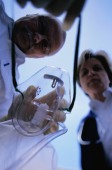
TUESDAY, March 12 (HealthDay News) — Very few surgical patients experience accidental awareness while under general anesthesia, according to a new study.
The Royal College of Anaesthetists and the Association of Anaesthetists of Great Britain and Ireland surveyed all senior anesthetists at National Health Service hospitals in the United Kingdom, asking them how many cases of accidental awareness during general anesthesia they encountered in 2011.
Previous research has suggested a high rate of accidental awareness, occurring in about one in 500 patients. But this study found that the rate was one in 15,000. The researchers also found that only about 2 percent of anesthetists routinely use brain-monitoring equipment to keep tabs on patients during surgery.
The findings, published in the journals Anesthesia and The British Journal of Anaesthesia, appeared online March 12.
“Anesthesia is a medical specialty very much focused on safety and patient experience,” study lead author Jaideep Pandit, a consultant anesthetist in Oxford, said in an Anesthesia news release. “We identified accidental awareness during anesthesia as something which concerns patients and the profession. The profession is therefore undertaking this major study so that we can better understand the problem and work to reduce the likelihood of it happening to patients.”
“We are particularly interested in patient experiences of awareness,” Pandit added. “Although we know that some patients do suffer distress after these episodes, our survey has found that the vast majority of episodes are brief and do not cause pain or distress.”
The researchers plan to investigate why their findings are so different from the results of previous studies.
“Risks to patients undergoing general anesthesia are very small and have decreased considerably in the last decades,” study co-author Tim Cook, a consultant anesthetist in Bath, said in the news release. “Of the 3 million general anesthetics administered in [National Health Services hospitals] each year, only a very small number of patients experience awareness during anesthesia, with the majority of these occurring before surgery starts or after it finishes.”
“While our findings are generally reassuring for patients and doctors alike, we recognize that there is still more work to be done,” Cook said. “We are spending the next year studying as many of the cases as possible to learn more from patients’ experiences.”
More information
The MedlinePlus Medical Encyclopedia has more about anesthesia.

